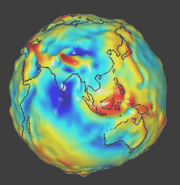 |
|
Asia faces living nightmare from climate
change | |
The weather predictions for Asia in 2050 read like a script from a
doomsday movie.
Except many climatologists and green groups fear they will come true
unless there is a concerted global effort to rein in greenhouse gas emissions.
In the decades to come, Asia -- home to more than half the world's 6.3
billion people -- will lurch
from one climate extreme to another, with impoverished farmers battling
droughts, floods, disease, food shortages and rising sea levels.
"It's not a pretty picture," said Steve Sawyer, climate policy adviser
with Greenpeace in Amsterdam. Global warming and changes to weather
patterns are already occurring and there is enough excess carbon dioxide
and other greenhouse gases in the atmosphere to drive climate change for
decades to come.
Already, changes are being felt in Asia but worse is likely to come,
Sawyer and top climate bodies say, and could lead to mass migration and
widespread humanitarian crises.
According to predictions, glaciers will melt faster, some Pacific and
Indian Ocean islands will have to evacuate or build sea defenses, storms
will become more intense and insect and water-borne diseases will move
into new areas as the world warms.
All this comes on top of rising populations and spiraling demand for
food, water and other resources. Experts say environmental degradation
such as deforestation and pollution will likely magnify the impacts of
climate change.
In what could be a foretaste of the future, Japan was hit by a record
10 typhoons and tropical storms this year, while two-thirds of Bangladesh,
parts of Nepal and large areas of northeastern India were flooded,
affecting 50 million people, destroying livelihoods and making tens of
thousands ill.
The year before, a winter cold
snap and a summer heat
wave killed more than 2,000 people in India.
(Agencies) |
對(duì)2050年亞洲氣候的預(yù)測(cè)就像一部關(guān)于世界末日的電影劇本。
很多氣候?qū)W家和綠色組織擔(dān)心這一切會(huì)變成現(xiàn)實(shí),除非全球的人們能夠達(dá)成共識(shí),協(xié)力控制溫室氣體的排放。
在未來(lái)幾十年里,亞洲(全球63億人口中超過(guò)一半人的家園)的氣候?qū)A向另一個(gè)極端,貧困的農(nóng)民將和干旱、洪水、疾病、食物短缺以及不斷升高的海平面進(jìn)行斗爭(zhēng)。
“這不是一幅美麗的圖畫(huà)。”阿姆斯特丹“綠色和平”組織的氣候政策顧問(wèn)史蒂夫·索伊爾說(shuō)。全球變暖和天氣模式的改變已經(jīng)發(fā)生,大氣層中過(guò)量的二氧化碳和其他溫室氣體足以加速未來(lái)幾十年的氣候變遷。
索伊爾和一些研究氣候問(wèn)題的知名團(tuán)體認(rèn)為,目前在亞洲已經(jīng)能察覺(jué)到某些變化,但以后的情況可能會(huì)更糟。這種變化還可能導(dǎo)致大規(guī)模的移民和普遍的人道主義危機(jī)。
據(jù)推測(cè),冰山會(huì)加速融化,太平洋和印度洋上的一些海島將被迫疏散島上居民,或者修建防浪堤。隨著全球越來(lái)越溫暖,暴風(fēng)雨會(huì)更加猛烈,由昆蟲(chóng)和飲水傳染的疾病將擴(kuò)散到新的地區(qū)。
這一切的到來(lái),將使人類本已面臨的人口增長(zhǎng)和對(duì)食物、飲水及其它資源需求日增的問(wèn)題雪上加霜。專家認(rèn)為,環(huán)境惡化,如森林砍伐和環(huán)境污染,將很可能加劇氣候變化造成的影響。
有些例子可以看作對(duì)將來(lái)的預(yù)示:今年,日本遭到創(chuàng)記錄的10級(jí)臺(tái)風(fēng)和熱帶風(fēng)暴的侵襲。孟加拉國(guó)2/3的國(guó)土、尼泊爾部分地區(qū)和印度東北的大部分地區(qū)均發(fā)生洪災(zāi),影響波及5千萬(wàn)人口,毀壞了人們的生活,還造成數(shù)萬(wàn)人染病。
去年,印度的一場(chǎng)冬季寒流和夏季熱浪奪走了兩千多人的生命。
(中國(guó)日?qǐng)?bào)網(wǎng)站譯) |
